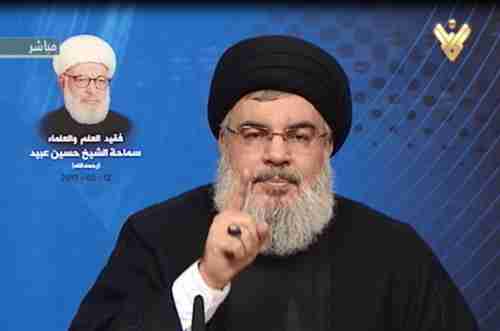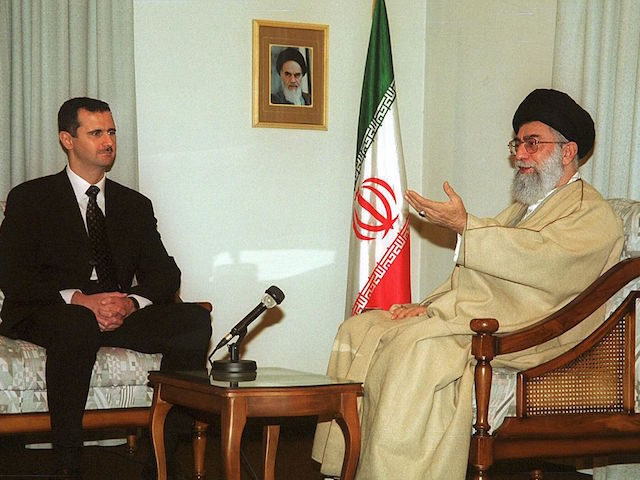This morning’s key headlines from GenerationalDynamics.com
- Hezbollah keeps on fighting, but says it will honor Syria ceasefire
- Tensions grow over the future of Bashar al-Assad
Hezbollah keeps on fighting, but says it will honor Syria ceasefire

Sayyed Hasan Nasrallah on Sunday (al-Manar)
On Sunday, Sayyed Hasan Nasrallah, the leader of Hezbollah, Iran’s puppet terrorist organization, gave a major televised speech to his followers insisting that Hezbollah fully supported the ceasefire agreement negotiated three weeks ago by Russia, Iran, and Turkey. He said that he was responding to reports in the Arab press that there were major disagreements between Iran and Russia, and claimed that he wanted the forces of Syria’s President Bashar al-Assad to keep on fighting, and to continue to eliminate as much of the Sunni population as possible. Nasrallah contradicted those reports in his televised speech:
We [support] an agreement that ends the bloodshed and paves way for a national reconciliation [in Syria]. Hezbollah and Iran support the ceasefire, the reconciliation, and the political settlement in Syria, while some Arab states are still backing the military option.
Hezbollah strongly supports, not just the Astana ceasefire, any ceasefire agreed upon in Syria [in order to] prevent bloodshed and pave the way for political solutions.
Nasrallah was referring to the peace talks that were held last month in Astana, the capital city of Kazakhstan.
Nonetheless, there is currently no ceasefire. Hezbollah forces took the lead in fighting in the region called Wadi Barada in the suburbs of Damascus, under control of anti-Assad rebels who are theoretically supposed to be protected by the ceasefire agreement. According to Nasrallah, Hezbollah is continuing to fight “terrorists” in Syria.
In fact, none of the groups fighting in Syria – Iran, al-Assad, Hezbollah, Russia, Turkey – is honoring the ceasefire. The next round of peace talks is scheduled for February 20.
As I’ve been writing for years, Generational Dynamics predicts that in the approaching Clash of Civilizations world war, China, Pakistan and the Sunni Muslim countries will be on one side, and the US, Russia, India and Iran will be on the other side. Reuters and Press TV (Tehran)
Related Articles
- Russia, Iran, Turkey sign farcical Syria peace agreement (25-Jan-2017)
- U.N. Security Council adopts farcical ‘peace plan’ for Syria (22-Mar-2012)
- Kofi Annan resigns in failure as Syria envoy (03-Aug-2012)
- Syria’s ‘peace conference’ proceeds as total farce (29-Jan-2014)
Tensions grow over the future of Bashar al-Assad
Reports of disagreements between Russia and Iran began with last month’s Astana peace talks because they did not go as plan. There was sharp disagreement over the participation of the United States in the negotiations, which Russia favored and which Iran considered to be unacceptable.
The final statement produced by the Astana talks called for a ceasefire, but no Syrians were party to the statement, as it was signed only by Turkey, Iran, and Russia. The negotiators for the anti-Assad rebels wouldn’t sign it unless it called for al-Assad to step down. Al-Assad’s negotiators would not sign it because they objected to Turkey’s participation, and to Turkish forces in northern Syria where they are fighting ISIS.
The catalyst for all these disagreements is al-Assad himself. All sides appear to agree that al-Assad is so divisive that there will never be peace in Syria as long as he’s in power. At the very least, he would have to step down and be replaced by someone from his own Alawite clan.
The anti-Assad rebels want him gone. The Turks want him gone too, but are willing to put up with him if it means an end to the Syrian war. The Russians want their military bases to lie within a stable Syria, but they are not tied to al-Assad and are willing to consider having him step down at some time in the near future.
But Iran is adamant that al-Assad must stay, and cannot even be replaced by someone with similar policies. According to one analysis, the cause springs from the fact that Iran is quite isolated in the region, as the only Shia Muslim state, but surrounded by Sunni Muslim and Christian states. Thus, Iran is forced to rely on non-state alliances – the Houthis in Yemen, Hezbollah in Lebanon, the Northern Alliance in Afghanistan, the Badr Organization in Iraq, Islamic Jihad in Gaza, and Shia/Alawite Bashar al-Assad in Syria – forming the “Shia Crescent.” According to this analysis, if Iran is not completely loyal to al-Assad, then all the other non-state groups in its coalition will receive a signal that they are expendable as well, which would destabilize the entire coalition. Instead, Iran sees that it must remain completely loyal to al-Assad, and Hezbollah militias must remain in Syria to protect Iran’s interests there – including from the Turks and the Russians.
During the peace talks in Astana, Turkey demanded that Hezbollah’s militias be pulled out of Syria, and Iran rejected that demand for the reasons just given.
In fact, according to Debka, Iran is planning for a much more aggressive role for Hezbollah in Syria. As long-time readers know, I like to reference Debka’s subscriber-only newsletter (sent to me by a subscriber), which is written from Israel’s point of view, because they have military and intelligence sources that provide valuable insights. However, as usual, I have to warn readers that they definitely do get some things wrong. The information that I’m presenting here from their newsletter is not confirmed by any other sources I’ve seen, but it’s generally consistent with other reports.
According to the newsletter, Iran is developing an “unacknowledged cold war” with Russia, by taking control of assets within Syria that give it enough influence to challenge both Russia and al-Assad. Some of these steps are as follows:
- The National Defense Force (NDF) militia has been set up to draw in the poor, jobless, and forgotten elements of Syrian society by lavishing on them wealth and influence far beyond the wages of Syrian army regulars.
- The Hezbollah militias have been given a clandestine task: Winning young Syrians over to join them instead of the Syrian army. In this way, Iran is sapping the central regime’s authority and boosting Iranian influence in Damascus.
- Iranian agents have bought up blocks of Syrian real estate, mainly in Damascus, and have been licensed as operators of Syria’s mobile phone service.
- Iran has increased the number of Shia holy places in Damascus and Homs in keeping with the massive displacement of Sunni populations as refugees.
According to the newsletter, Iran can use these assets as leverage in any future peace negotiations for Syria, in order to guarantee that its interests are fully protected. The National (UAE, 28-Jan) and Reuters (25-Jan) and Middle East Eye and Debka
KEYS: Generational Dynamics, Lebanon, Iran, Sayyed Hasan Nasrallah, Syria, Turkey, Russia, Astana, Kazakhstan, National Defense Force, NDF
Permanent web link to this article
Receive daily World View columns by e-mail

COMMENTS
Please let us know if you're having issues with commenting.